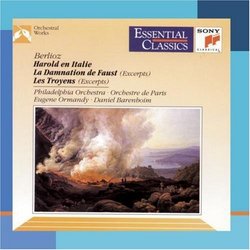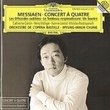| All Artists: Hector Berlioz, Daniel Barenboim, Eugene Ormandy, Paris Orchestra, Philadelphia Orchestra, Joseph DePasquale Title: Berlioz: Harold In Italy Members Wishing: 0 Total Copies: 0 Label: Sony Classical Release Date: 12/29/2009 Genre: Classical Styles: Instruments, Strings Number of Discs: 1 SwapaCD Credits: 1 UPC: 074645325521 |
Search - Hector Berlioz, Daniel Barenboim, Eugene Ormandy :: Berlioz: Harold In Italy
 | Hector Berlioz, Daniel Barenboim, Eugene Ormandy Berlioz: Harold In Italy Genre: Classical
Berlioz: Harold In Italy, Three Orchestral Pieces From La Damnation De Faust, More / Eugene Ormandy, Charles Munch, Daniel Barenboim |
Larger Image |
CD DetailsSynopsis
Album Description Berlioz: Harold In Italy, Three Orchestral Pieces From La Damnation De Faust, More / Eugene Ormandy, Charles Munch, Daniel Barenboim Similarly Requested CDs
|
CD ReviewsSony's Got "Harold" Cornered! Michael B. Richman | Portland, Maine USA | 08/17/2000 (5 out of 5 stars) "Sony Classical has the "Harold In Italy" market cornered. This recording by Ormandy/Philadelphia, along with the "Bernstein Century" version, are no question the best available on CD. I personally find the Bernstein a notch ahead because I love the dramatic readings he brings to most of his recordings. With that being said, there are several reasons why many should opt for this one nonetheless. First, the price can't be beat -- only eight dollars! Second, you get more music here. On the Bernstein Century you get one extra piece, "La Mort de Cleopatre," where as here you get two, excerpts from both "La Damnation de Faust" and "Les Troyens." Finally, the "Les Troyens" excerpts are performed by the Boston Symphony Orchestra under Charles Munch's leadership. Munch is one of the truly great intepreters of Berlioz, and his recording of "Symphonie Fantastique" on RCA Living Stereo is the quintessential version. In all, you just can't go wrong with this purchase." A hero in a world of thieves Jacques COULARDEAU | OLLIERGUES France | 07/31/2003 (5 out of 5 stars) "In 1833, Berlioz joins the mythical and poetical character of Childe Harold, developed by Lord Byron, to his own recollections of Italy and to his vision of a world of strife, struggle and love. But he uses his music to create atmosphere and character. So Harold becomes the viola and the viola gives Harold a depth and a liveliness that no other instrument could, an instrument both very flexible and gathering some male accents from its dense and reverberating qualities. Berlioz transforms the symphony into a story, an adventure, an epic going beyond all that had been done before him, particularly by Beethoven, to reach a level of pure dramatic story telling and saga singing. He thus also goes back to old human practices. That of telling the myths that have shaped humanity and history. That too of imagining the power of a character, a hero that transforms and influences the course of historical events. The symphony joins thus both an epic myth and a poetic vision. It aims at embodying the desire of the composer to change the world and his fear or even utter awe in front of a world that is not able to change fast enough. And here the viola becomes Berlioz himself, Harold is Berlioz, Berlioz is Byron, Berlioz's music is Byron's poetical harmony. This music willfully takes part in the building of modern man's conscience, the conscience of the modern world, of the new age emerging from history. The pilgrims are henceforth the artists and their creations walking in a world of thieves and yet aiming at dragging this world to a higher stage of civilization. Berlioz is a progressive moralist of human change.Dr Jacques COULARDEAU, University of Perpignan" I like it, I like it! richard mullany | waynesville, north carolina United States | 09/06/2001 (5 out of 5 stars) "This is a fine release! I have this and also another winner.The BSO/Munch/Primrose 1958 RCA release. This offers a different coupling,"Symphony on a French Mountain Air" by D'Indy with the pianist Nicole Henriot Schweitzer. Both cd's will earn their keep. This music would be a good place for the newcomer to start exploring Berlioz, one of the most fascinating composers who ever lived, how his life has escaped Hollywoods notice is beyond me. His music is so individual that after a few years of exposure it is easily identified by it's sound. orchestration, and use of modulation. In the old days there were two conductors who knew their way around Berlioz: Beecham and Munch. You can't go wrong fifty years later than to go with either of them."
|

 Track Listings (9) - Disc #1
Track Listings (9) - Disc #1

